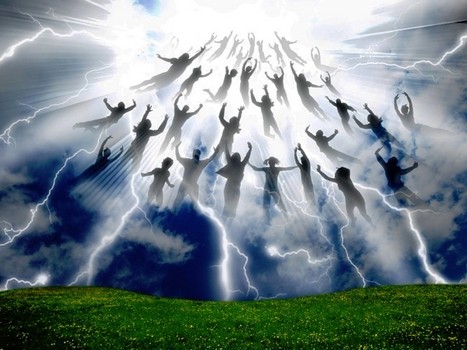Turbulent times stimulate vivid imaginations. With two egotistical buffoons (Trump and Johnson) proving every minute that they are catastrophically unfit for high office, tensions in the Middle East rising, Russia rattling its sabre, the Chinese building up massive armed forces, Islamic terrorists at large, Jerusalem re-established as the Capital of Israel, the environment trashed by the rapacious greed of humans, and weather systems going crazy with global warming – there’s little doubt we’re in a period of upheaval.
True to form, it’s against this background of uncertainty, fear and dislocation that people are reaching for lurid fantasies as comfort. Naturally, they’re lurid fantasies in which they personally are brought to a paradise of eternal peace and security. Social media is now saturated with bizarre predictions that we’re in the end times. Digital platforms are awash with religious cults and ludicrous conspiracy theories such as Q-Anon.
So you may imagine the scene. Believers hot foot it up Tinto Hill on an evening full of expectation. Thrilling expectation, because this night is going to be The End of The World. The chosen ones (among whom they are counted in the number) are to be taken to a heavenly place in a cataclysmic event called the ’Rapture’. Seven hours later, bedraggled and cold in the damp morning they trudge down the path, sandwiches soggy and the hot chocolate flask empty. The disappointment must be crushing. God had not chosen to end the world – not that night anyway. In the forthcoming weeks their pastors/priests/theologians will declare that there had been a slight misreading of Scripture. The timeline for the Apocalypse will soon be ‘re-calibrated’ and they’re sure now of the exact date. Get your house in order before it happens and share your wives and daughters with me before it does.
Marina Benjamin (http://marina-benjamin.com/about/) investigates why so many people, throughout history, have believed fervently that their time just happens to be the run up to the Apocalypse. She offers a lively enquiry into humanity’s obsession with its own ultimate demise. Benjamin describes the brooding and righteous world of Apocalypse, where our darkest nightmares threaten to burst into the realms of the real, vindicating the lucky few, while condemning the rest of humanity to eternal suffering and punishment. After the ancient Hebrews banished apocalyptic books from their scriptures, eschatology went underground. But it re-emerged with the cult of Jesus, and from there went on to have many embodiments; from Patmos to Waco, the Reformation to the French Revolution, Joanna Southcott’s virgin birth to Joseph Smith’s empire building, to Heaven’s Gate’s Hollywood-style suicide pact. In the present day the apocalyptic meme imbues film, fiction and fitness culture; it underpins our directional understanding of cosmology, the purposeful march of history and the teleology of climate change. It sometimes feels as though we can’t see ourselves clearly without having the end times in view. We cannot bear to believe that we’re not the point of it all.
Prepare to read this by listening to the Radio 4 ‘In Our Time’ podcast (45 minutes, first broadcast 17 July 2003) on the subject of the Apocalypse from the link http://www.bbc.co.uk/programmes/p0054914 With Martin Palmer, theologian and Director of the International Consultancy on Religion, Education and Culture; Marina Benjamin, journalist and author of Living at the End of the World; Justin Champion, Reader in the History of Early Modern Ideas at Royal Holloway College, University of London.
Also listen to the R4 ‘In Our Time’ podcast (first broadcast 26 September 2019) on ‘The Rapture’ from the link https://www.bbc.co.uk/programmes/m0008p2k Melvyn Bragg and guests discuss the ideas developed by the Anglican priest John Nelson Darby (1800-1882), drawn from his reading of scripture, in which Jesus would suddenly take His believers up into the air, and those left behind would suffer on Earth until He returned with His church to rule for a thousand years before Final Judgement. Some believers look for signs that civilization is declining, such as wars and natural disasters, or for new Roman Empires that would harbour the Antichrist, and from these predict the time of the Rapture. Darby helped establish the Plymouth Brethren, and later his ideas were picked up in the Scofield Reference Bible (1909) and soon became influential, particularly in the USA. Contributors to the programme are Elizabeth Phillips (Research Fellow at the Margaret Beaufort Institute at the University of Cambridge and Honorary Fellow in the Department of Theology and Religion at Durham University), Crawford Gribben (Professor of Early Modern British History at Queen’s University Belfast) and Nicholas Guyatt
(Reader in North American History at the University of Cambridge)
Check if this indispensable guide to your future (?) is in stock at your local library by consulting the online catalogue here at https://www.sllclibrary.co.uk/cgi-bin/spydus.exe/MSGTRN/OPAC/BSEARCH


304 pages in Picador paperback edition.
First published 1999
ISBN 978-0330342049


